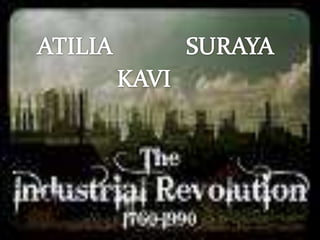
Industrial Revolution
- 3. INTRODUCTION THE INDUSTRIAL REVOLUTION(IR) WAS BEGIN IN THE 18TH TO THE 19TH CENTURY. CHANGES HAPPEN IN AGRICULTURE, MANIFACTURING, MINING AND TRANSPORTATION. MAN POWER(LABOUR)->ANIMAL POWER->MECHANICAL POWER IR INTRODUCE NEW METHODS OF CULTIVATION OF CORPS IN AGRICULTURE REVOLUTION AND MODERN METHODS OF MANUFACTURING GOOD IN MECHANICAL REVOLUTION. THIS DEVELOPMENTS TRANSFORMED A LARGELY RURAL POPULATION FROM MAKING A LIVING FROM AGRICULTURAL TO A TOWN CENTRED SOCIETY ENAGED IN MANIFACTURE. IR IS A COMBINATION OF AGRICULTURE REVOLUTION AND MECHANICAL REVOLUTION.
- 4. AGRICULTURAL REVOLUTION BRITAIN NEEDED MORE FOOD FARM WERE STILL RUN ON THE MEDIEVAL STRIP SYSTEM NEW IDEAS AND MACHINERY WERE BEING DEVELOP CHANGE IN METHOD IN CIVILIZATION OF CROPS TO INCREASE PRODUCTION FOR COMMERCIAL PURPOSE MIXED FARMING ROTATION FARMING IN THE 18TH CENTURY DRILLS FOR SOWING SEED AND MACHINES FOR THRESHING WERE INVENTED
- 5. MECHANICAL REVOLUTION MANY NEW MACHINES WERE INVENTED DURING THE 18TH CENTUARY EARLY INVENTIONS WERE RELATED TO CLOTH MANUFACTURE THERE A FEW EXAMPLE OF NEW INVENTION AND THE MAKER (1) IN 1733 JOHN K INVENTED THE ‘FLAYING SHUTTLE’ TO WEAVE CLOTH (2) IN 1764 JAMES HARGREAVES INVENTED THE ‘SPINNING JENNY’ FOR MAKING THREAD (3) IN 1767 RICHARD ARKWRIGHT INVENTED THE ‘WARET FRAME’
- 6. IN 1769 JAMES WATT INVENTED THE STEAM ENGINE BY END OF THE 18TH CENTURY C.STEAM POWER BEGAN TO BE USE IN OTHER INDUSTRIES WITH THE USE OF STEAM POWER MACHINES HAD TO BE SET UP IN FACTORIES. THE WAS AN INCREASE IN THE USE OF IRON WORKERS WHO WERE SO USE TO WORKING FROM HOME HAD TO BE BROUGHT TO FACTORIES LOCATED IN TOWNS TO WORK.
- 8. CAUSES OF INDUSTRIAL REVOLUTION BEGAN IN ENGLAND AGRICULTURE REVOLUTION WAS THE FORERUNNER THE INDUSTRIAL REVOLUTION ENGLAND HAD SUITABLE LAND FOR AGRICULTURE INCREASE IN POPULATION BY ABOUT 50% BETWEEN 1750 UNTIL 1801 SUPPORT FROM GOVERNMENT WITH REGARD TO LAND OWNERSHIP CONSTRUCTION OF ROADS AND CANALS- THEY WAS ALSO POLITICAL STABILITY INVENTORS WERE GIVEN PATENT RIGHTS A GROUP OF CITIZEN CALLED ‘PURITAN’ HAD INVEST MONEY TO THIS INDUSTRY AFTER THEIR POLITIC RIGHTS HAVE BEEN DENIED
- 9. PERSON WHO MADE THE THE CHANGES (TRANSPORTATION/COMMUNICATION) JAMES BRINDLEY -BUILT A NETWORK OF FIRST CLASS CANALS.HE BUILT THE BRIDGE WATER CANAL IN 1759-1761 BETWEEN WORSELY AND MANCHESTER. -THE GRAND TRANK CANAL BETWEEN TRENT AND MERSEY, AND STAFFORDSHIRE AND WORCESTERSHIRE CANAL BETWEEN TRENT AND SOVERN WERE ALSO BUILD BY HIM -OVER 350 MILES OF CANALS
- 10. GEORGE STEPHENSON -INVENTED THE FIRST TRAIN IN 1829 -FIRST TRAIN IN ENGLAND WAS BETWEEN LIVERPOOL AND MANCHESTER -IT WAS CALLED ‘THE ROCKET’
- 11. SAMUEL MORSE -INVENTED A TELEGRAPH SYSTEM -IN 1844 TELEGRAPH SERVICES BEGAN BETWEEN WASHINGTON AND BALTIMORE ALEXENDER GRAHAM BELL -INVENTED THE TELEPHONE IN 1876 THOMAS TELFORD -BEST KNOWN FOR PLANNING ROADS AND BUILDING BRIDGES
- 12. CHANGES TOOK PLACE IN EUROPE DURING IR IN THE 18TH CENTURY POLITIC ECONOMY SOCIAL
- 13. POLITIC EFFECT Capitalism vs Socialism Capitalism - individuals, rather than governments, control the factors of production (land, labor, capital); businesses are privately owned Socialism - government owns the means of production and operate them on behalf of the people Reform movements
- 14. ECONOMY EFFECT Goods were produced more efficiently Supply of goods increased Prices of goods decreased More consumer demand due to lowered prices Jobs were created in factories and on rail lines Social changes as well
- 15. SOCIAL EFFECT Industry changed Europeans’ way of life Urbanization: a movement of people to cities Changes in farming, demand for workers Dirty and disease ridden from factories Cities were unsafe Shabby apartment buildings No light, no running water, many to one room, no sanitation system
- 16. Hazards of Factory Life Long work days (12-16 hours) No safety devices (loss of limbs, lives) Pollution (coal dust, lint into lungs of workers) Women were paid less than men Many employers preferred women to men Men could adapt to machines better, easier to manage Grim family life (“double-shift”)
- 17. Children Suffered in Mills and Mines Orphaned children worked for food and board Many families needed the extra money Many were beat, very few received an education Factory Act of 1833: minimum 13 years old, work maximum 8 hour day Middle Class Expanded Rise of factory owners, shippers and merchants Lived in nice housing, dressed and ate well, women did not work Viewed the poor as lazy or ignorant; responsible for their own misery
- 18. THANK YOU HOPE ALL OF YOU UNDERSTAND THIS TOPIC =)